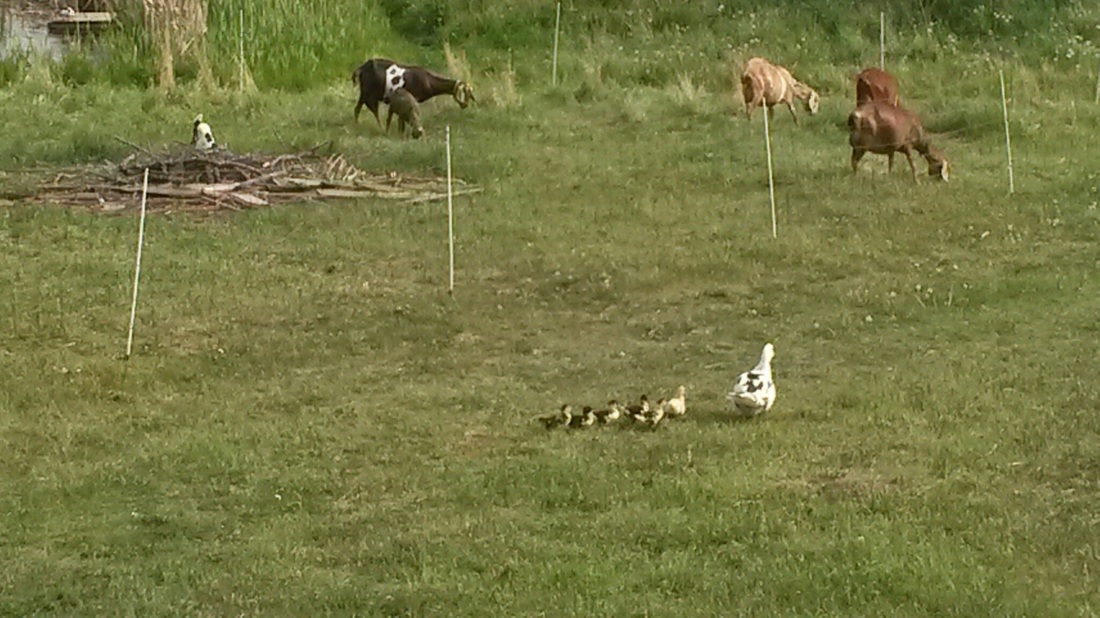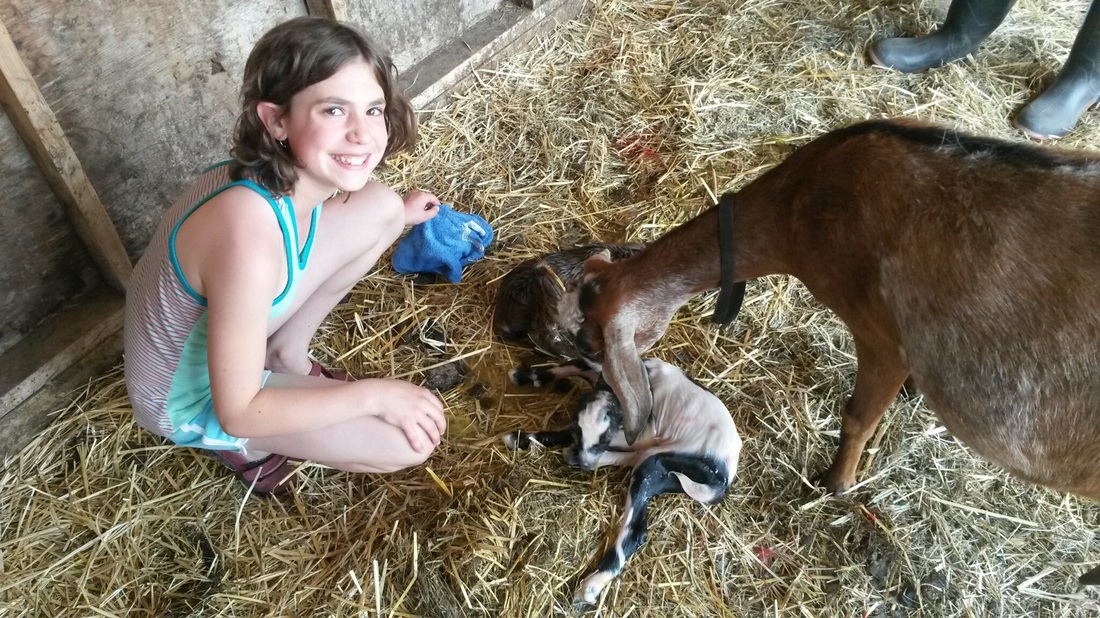|
12/30/2015 Wed, Dec 30, 2015This is my favourite cheese recipe from a member of my first on line support group for all things cow :) it's called the Family Cow forum and the founder is Joann Groman. This recipe came in a thread in the recipe section and WOW! Are there inspiring pictures in there too!!! So adaptable and flexible :)
Why don't you start with a real real easy one that yields one of the most flavorful, creamy cheeses. Bring 2 to four gallons of milk right from the cow. (Or, bring refrigerated milk to room temperature.) Mix in a packet of Direct Set culture (mesophilic) or add 1/4 to 1/2 cup of your own culture (mesophilic). Mix really really well. If you are using your own culture, stir it in a cup or bowl until it is smooth and add milk to it in the cup or bowl to thin it and stir, stir, stir, - then, add it to the milk. Cover the kettle of milk with a towell and leave it for one hour - to two hours. Doesn't matter - each change in the ripening time will make a teeny bit of a change in the final cheese. (That's the beauty of it.) Add a half teaspoon of rennet to 1/4 cup of water and stir it into the milk thoroughly. Cover and let it set for an hour to 1 and a half hours . Check to see if it is set firmly. If not leave it a little longer. (Remember, not having the milk warm enough will cause it not to set up well.) Cut the curd and leave it set for at least half an hour. Now is the easy part. Stir the kettle every once in a while. As you stirr and large curds come to the top, cut them with your spoon. Cover and go on about your day. Stop back every half hour to hour and give it a stir. Just for ten seconds. As the day progresses, the curd will continue to release whey and you will stir to keep it from matting. If you get side tracked and the curds have matted some, just stir them apart with the spoon or wash your hand and arm very well and swish them apart with your hand. When the curds are "done", they will promptly settle to the bottom each time you stir, and you will see the change in their texture. They won't get rubber-y and firm like for a cheddar. (The description that they give for the right texture for cheddar is "like cooked chicken".) They won't be like that. They will be springy-er than cottage cheese and firmer, too, but it will remind you of how cottage cheese looks. Lots of things determine how fast the curds get "done". If you stir it pretty often, it gets done faster. I have had this cheese be ready for the press in 4 hours from cutting the curd and I have had a busy day where it actually took 8 hours. Each of these variations affects the final cheese and gives each one a personality of its own. They are all basically the same, but each a little different. Drain the whey off and add 3 tablespoons of salt to the curd for each 2 gallons of milk that you used. That seems like a lot of salt, but some of it leaves as the whey presses out. And, that salt makes the cheese have such an excellent flavor. Line the press with cheesecloth. Put the curds in and press for 24 hours with 45 to 50 pounds. That's a hard press and it's a firm cheese that comes out. I don't flip it or change the cloth. I press ONE time. Take out of the press and place in the refrigerator for two days to air dry. Wax and let age 3 to 12 months. Ready to eat in 3. Summing up: Room temperature milk. Add culture to milk Let ripen Add rennet Let set Cut Curd Let set Stir, stir, stir , stir, stir, stir off and on all day. Drain whey Add salt Put in press Press for 24 hours Air dry in refr. Wax Age Of the four cheeses that I served to my dinner guests, this is the one that they all said was their favorite. You can change it a little, also, by making it without the cream. Remember, there is no heat used in making this cheese. No double boiler set up. Just you, one kettle, and a big spoon to stir. homestead2[/quote] 10/23/2015 Fri, Oct 23, 2015Fundraising for our newly formed Refugee Response Collective I will host a two-three hour cheese making workshop here at Good Note Community Farm on Nov.2 at 6pm We will learn how to make Syrian String Cheese , Majdouli, and a soft spreadable goat cheese called Jibneh. Monday Nov 2 , 2015 Basic cheese making will also be covered. . Cost $40-50 each... noting it's a fundraiser. .. tax receipts from Mennonite Central Commite (?) may be available? The name of our project is Safe and Sound!!!! Our group of 30+ families is fundraising to eventually bring Syrian refugee families here to Edmonton, but at the very least send much needed help to the overflowing camps 6/18/2015 Of Droughts And DucksAfter a slow start this spring, a lovely trip to a wedding in Denmark, we arrived home all ready to prepare beds and plant. All the hard work our former wwoofers put in is paying off as the raised beds were relatively weed free. I was so spring feverish before we left that I planted the carrots and Fava beans in early April. They weren't yet up when we got back three weeks later but a bit of watering and they appeared soon after. All seeds that I have saved or exchanged at Seedy Sunday.
So now we are in a daily habit of watering and moving of electric fences. One to keep our seedlings damp and second to keep the critters fed. The pasture is not growing much at all anymore and on this day (mid June) we are already finished 5 out of six pasture plots down the alley. We're saving the last one so that the wwoofers who are farm sitting for us will have an easier time of it. Our eight momma goats gave us 17!!!!! kids this year. So much joy in watching them bounce around the backyard within their fence. As Anna calls them "popcorn goats! !!" I'm composing this on my cell phone so here goes...me trying to add some pictures. |
Archives
August 2020
AuthorMaryann Borch, Categories |


 RSS Feed
RSS Feed
